Applied Psychology \ 1-1

Forensic psychologists are experts whose expertise is consulted in the judicial system. Forensic psychology, at the intersection of psychology and law, aims to produce scientific data in the solution of psycho-legal problems, transform the data into general rules, inform the legal system within the framework of the developed theories, and provide support to policy developers in order to design legal processes in a way that protects the life of the individual and society. In this context, forensic psychologists consider themselves responsible for presenting their expert opinion within the framework of cooperation with legal authorities in practice.
The "Forensic Psychology" book, the first of the three-book series; It consists of Forensic Psychology, Crime and Psychology, Criminal Profile, Ethics in Forensic Psychology. The historical journey of forensic psychology as a science, forensic psychology practices in the world and in Turkey, the relationship of forensic psychology with other disciplines, crime and crime types, the relationship between crime and psychopathology, criminal profiling, crime profile of suicide bombers, ethical principles for forensic psychologists and forensic psychology. Different dimensions of forensic psychology have been highlighted by including many topics such as the duties and responsibilities of psychologists. The topics are conveyed interactively and with rich case examples to guide forensic psychologists, psychologists, experts and practitioners interested in the forensic field.
The "Forensic Psychology" book, the first of the three-book series; It consists of Forensic Psychology, Crime and Psychology, Criminal Profile, Ethics in Forensic Psychology. The historical journey of forensic psychology as a science, forensic psychology practices in the world and in Turkey, the relationship of forensic psychology with other disciplines, crime and crime types, the relationship between crime and psychopathology, criminal profiling, crime profile of suicide bombers, ethical principles for forensic psychologists and forensic psychology. Different dimensions of forensic psychology have been highlighted by including many topics such as the duties and responsibilities of psychologists. The topics are conveyed interactively and with rich case examples to guide forensic psychologists, psychologists, experts and practitioners interested in the forensic field.

The science of psychology reveals the reflections of the theories it has developed in the field of practice, especially in the fields of clinical and applied psychology, through observation, interviews and psychological evaluations. It would be correct to say that these application tools are even more important in forensic-psychological processes. In this book; the similar and different aspects of forensic psychology practices with the practices in other fields of psychology are discussed, the dimensions in observation, interview and evaluation in forensic psychology are detailed, the minimum skills that a forensic psychologist should have and the opportunities to develop these skills, the challenging ways of forensic psychological assessment, assessment-specific skills and case studies. explained with examples.
This book is the second of the three series in the field of forensic psychology. In the book "Observation, Interview and Psychological Evaluation in Forensic Psychology", about criminals, victims, convicts and other parties in forensic processes, they are examined separately as "Observation and Interview in Forensic Processes" and "Psychological Evaluation in Forensic Processes". The topics are conveyed interactively and with rich case examples to guide forensic psychologists, psychologists, experts and practitioners interested in the forensic field.
This book is the second of the three series in the field of forensic psychology. In the book "Observation, Interview and Psychological Evaluation in Forensic Psychology", about criminals, victims, convicts and other parties in forensic processes, they are examined separately as "Observation and Interview in Forensic Processes" and "Psychological Evaluation in Forensic Processes". The topics are conveyed interactively and with rich case examples to guide forensic psychologists, psychologists, experts and practitioners interested in the forensic field.

The law, which is the general truth, has to benefit from the light of psychology in the investigation and prosecution of the crime and reintegrating the criminal to the society. Forensic psychology carries out both scientific and applied studies in the context of providing information to the field of law and helping the law in determining the truth and reintegrating the criminal into society. Criminals, victims, witnesses, convicts and other parties in the legal system are in the field of forensic psychology. We cannot help but think about what a wealth of work forensic psychology has in the processes of investigation, prosecution, approval and withdrawal of crime. This richness reminds us that psycho-legal expertise also has its own dynamics.
In the third of these book series, "Psychological Treatment and Rehabilitation in Forensic Psychology", since adults and children who cross paths with the legal system have different characteristics from each other, psychologists, forensic students are given in the sections "Psychological Treatment and Rehabilitation of Adults in Judicial Processes" and "Psychological Treatment and Rehabilitation of Children in Judicial Processes". The topics are conveyed interactively and with rich case examples to guide psychologists, forensic experts and practitioners. In addition to psychological treatment and rehabilitation with adults and children, the book also includes the "Interesting Cases in Forensic Psychology" section to enable us to think about the differences in cases seen in the forensic field.
In the third of these book series, "Psychological Treatment and Rehabilitation in Forensic Psychology", since adults and children who cross paths with the legal system have different characteristics from each other, psychologists, forensic students are given in the sections "Psychological Treatment and Rehabilitation of Adults in Judicial Processes" and "Psychological Treatment and Rehabilitation of Children in Judicial Processes". The topics are conveyed interactively and with rich case examples to guide psychologists, forensic experts and practitioners. In addition to psychological treatment and rehabilitation with adults and children, the book also includes the "Interesting Cases in Forensic Psychology" section to enable us to think about the differences in cases seen in the forensic field.

The fact that many well-known debates, from daily life to political issues, from social problems to scientific research, fall within the boundaries of morality, is not unique to this age. These debates, which spread to all areas of life, bring multi-disciplinarity on the ground of science. Among these disciplines, perhaps one of the most important contributions to the scientific literature on morality comes from the science of psychology, with its encompassing curiosity about the human and the human. In the modern science adventure of psychology, the subject of morality, whose traces we find in important researches in developmental psychology, clinical psychology, social psychology, experimental psychology, even industrial psychology and organizational psychology, is gaining visibility day by day and the study of morality from a psychological point of view attracts attention. With this work, which emerged in order to make a modest contribution to this scientific interest and to compile studies on morality systematically, it has been tried to describe a moral psychology framework with both theoretical and applied fields.

Spiritual or religious orientation in human life, along with many factors such as family characteristics, social environment, cultural context; it affects how individuals perceive and make sense of themselves, the events around them and the world, and also shapes the thoughts, feelings and behaviors of individuals. spiritual/religious beliefs and practices; it nurtures and connects families and communities, promotes recovery in times of crisis, and fosters resilience through prolonged adversity. In this respect, the fact that spiritual orientation constitutes an important part of clients and is an important component that should be emphasized in the therapy process has an undeniable potential. Although spiritual orientation is integrated into individual counseling approaches, it also appears as a very supportive element in the family therapy process. The necessity of family therapy comes to the fore when the family is the first environment in which people are born, the vital role and importance of family characteristics, upbringing styles, traditionally transferred values, communication and interactions within the family in the development of individuals and being psychologically healthy individuals. Spiritually oriented practices seem to be quite functional when dealing with problems in family members and family system. In this sense, spiritually oriented practices are needed in family therapy processes to be carried out with clients and family members who position their religious-spiritual dimensions at an important point in their lives and want them to be addressed in psychotherapy processes. In this context, this book primarily aims to provide a spiritually oriented perspective on basic family therapy theories, and then aims to make various contributions to theory and practice by providing a spiritually oriented perspective on many situations that can be experienced in the family. The book, which aims to shed light on the spiritual dimension of family therapy for individuals and specialists working in the field of mental health, especially PDR and Psychology, is enriched with practices and case examples.
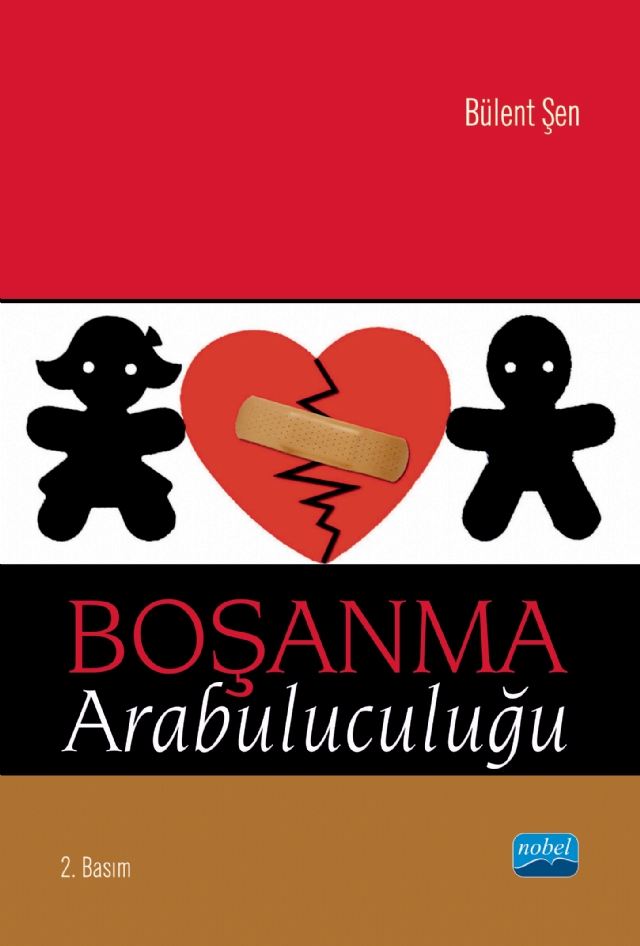
Couples who love each other, dream of growing old together, and after having a child, cannot solve their problems after many unwanted experiences, and perhaps decide to divorce after receiving family counseling; While experiencing the negative processes of divorce, they do not harm each other and their children more in cases where the conditions are made more difficult in the court environment, divorce can be more economical, in a shorter time, with fairer conditions for both parties, both parties and their families can remain friends after the divorce, children can always be It is thought that completing the divorce process by making joint decisions under the supervision of an impartial third person, where they can see both parents regularly and receive support, will contribute positively to both couples and children and society.
In the book, both domestic and international literature and practices have been tried to be presented to the readers with an impartial eye, and they will work on divorce mediation. to academics; to students and practitioners of law, social work, psychology, psychological counseling, sociology, child development, preschool education, family and consumer sciences; to family counselors; to family court judges and experts; To the members of the 2nd Civil Chamber of the Supreme Court; to experts who will conduct legal studies on this subject; it has been tried to give basic information to the managers of the relevant institutions and organizations, to the readers who are curious about the issue of divorce mediation and to the couples who want to get divorced by agreement.
At the end of the book; Family Counselors who have received 450 hours of training in the guidelines issued by the Ministry of Family and Social Policies and have a Family Counseling certificate, and the desire of Lawyers who have received mediation training within the scope of the Mediation Law, to work together and to carry out interdisciplinary and holistic studies on Divorce Mediation, which can set an example for other countries, has been expressed.
In the book, both domestic and international literature and practices have been tried to be presented to the readers with an impartial eye, and they will work on divorce mediation. to academics; to students and practitioners of law, social work, psychology, psychological counseling, sociology, child development, preschool education, family and consumer sciences; to family counselors; to family court judges and experts; To the members of the 2nd Civil Chamber of the Supreme Court; to experts who will conduct legal studies on this subject; it has been tried to give basic information to the managers of the relevant institutions and organizations, to the readers who are curious about the issue of divorce mediation and to the couples who want to get divorced by agreement.
At the end of the book; Family Counselors who have received 450 hours of training in the guidelines issued by the Ministry of Family and Social Policies and have a Family Counseling certificate, and the desire of Lawyers who have received mediation training within the scope of the Mediation Law, to work together and to carry out interdisciplinary and holistic studies on Divorce Mediation, which can set an example for other countries, has been expressed.
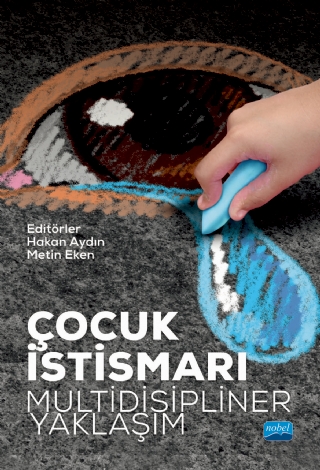
Child abuse is a subject that needs to be studied meticulously in order to be handled with a multidisciplinary approach and to protect the best interests of children. Undoubtedly, the most important contribution to the solution efforts regarding the problem of child abuse will be the attempts to increase scientific and managerial knowledge about this field. The fact that these initiatives include a multidisciplinary approach is of strategic importance considering the extremely limited production in this regard and has the potential to strengthen the search for solutions. Depending on the stated purpose and importance, the ProChild Project has determined as one of its main outputs the production of an edited book, which deals with the problem of child abuse with a multidisciplinary approach. This book; It deals with the problem of child abuse with its knowledge of medicine, education, law and communication, focuses on the problem of representation through the news of child abuse published in internet newspapers, and opens the digital components of child abuse to discussion in detail.

What was childhood trauma? Could the traumas experienced in the early period continue their effects throughout life? Well, what could a child have experienced that would cause his life to lose all its colors?
In this book, which aims to shed light on the bitter darkness of all these questions, you will encounter the stories of eight little children. You will witness how some people lost all their colors in their safe harbor, some on their birthday, which they waited for a whole year, in the darkness of a rough night that some never expected, and how some people lost all their colors in a hug they embraced with love and trust. Then how those disappearing colors blend into each other and turn into darkness...
Well, is it possible to strike a match into this deep darkness? Can this darkness be lit up a little bit? Is there a time to illuminate these deep darkness in which we are lost? But what about a way to regain all lost colors?
Another purpose of this book, while answering all these questions, is to introduce the reader to psychotherapy interventions that can be applied in the early trauma process, and to raise awareness of how these interventions contribute to the trauma process, and to convey the process of reprocessing each lost color into the child's psyche.
In this book, which aims to shed light on the bitter darkness of all these questions, you will encounter the stories of eight little children. You will witness how some people lost all their colors in their safe harbor, some on their birthday, which they waited for a whole year, in the darkness of a rough night that some never expected, and how some people lost all their colors in a hug they embraced with love and trust. Then how those disappearing colors blend into each other and turn into darkness...
Well, is it possible to strike a match into this deep darkness? Can this darkness be lit up a little bit? Is there a time to illuminate these deep darkness in which we are lost? But what about a way to regain all lost colors?
Another purpose of this book, while answering all these questions, is to introduce the reader to psychotherapy interventions that can be applied in the early trauma process, and to raise awareness of how these interventions contribute to the trauma process, and to convey the process of reprocessing each lost color into the child's psyche.

The fact that a person has value or produces value is one of the most important characteristics of a human being. A person becomes a “human” with his values and exhibits human characteristics. Values, which are one of the basic elements that determine how we will live our life as human beings, how we will choose against more than one option or what we will prefer, come into play at every moment and every stage of our lives. We see or feel the impact of values, starting with the family, where we open our eyes to life, the first environment of socialization and education, at school, in daily life and even in the media.
This book deals with twelve human and human values that have their counterparts in both Western and Eastern cultures. The importance of each value, its individual and social functions are mentioned and a general framework is tried to be drawn on how to gain value. of the book; to researchers working on values; to families and educators who want to raise generations in a way that adheres to values; undergraduate and graduate students; It is hoped and expected that it will be useful to all readers who are interested in the field of values and will contribute to the literature.
This book deals with twelve human and human values that have their counterparts in both Western and Eastern cultures. The importance of each value, its individual and social functions are mentioned and a general framework is tried to be drawn on how to gain value. of the book; to researchers working on values; to families and educators who want to raise generations in a way that adheres to values; undergraduate and graduate students; It is hoped and expected that it will be useful to all readers who are interested in the field of values and will contribute to the literature.

The aim of this book is to examine the positive practices and interventions in schools that are especially culturally sensitive and adopt multicultural education, by considering the migration experiences of children and adolescents in different contexts such as family, peers and school. For this purpose, the risks and protective factors that immigrant children and adolescents face in the process of acculturation and psycho-social adaptation, the effects of traumatic events, the language and mind development processes, which are one of the important building blocks of acculturation, the role of teachers and psychological counselors in creating a culturally sensitive school climate and multicultural education. and their responsibilities, the effect of intergroup contact on friendship relations in the school environment, and the intervention programs developed to prevent the academic, cognitive, social and emotional problems experienced by immigrant children are discussed in detail.
We aim for the book to appeal to a wide range of readers, from mental health professionals to educators, from social workers to non-governmental organizations, and from academics to students. In the hope that we can be useful to all children who migrate or have to migrate...
We aim for the book to appeal to a wide range of readers, from mental health professionals to educators, from social workers to non-governmental organizations, and from academics to students. In the hope that we can be useful to all children who migrate or have to migrate...

This book; It is a practical book focusing on school and classroom activities, as a continuation of the theoretical work "Immigrant Children and Adolescents: Acculturation, Integration and Education" (Nobel Publishing, 2020). The book was written with the aim of conveying the activities created with the contributions of teachers working in schools where immigrant students are educated and academicians working in the field of adaptation of immigrant children, and the relevant theoretical infrastructure to all experts working in the field of academics, teachers, students, psychologists, psychological counselors, program development and social work. . For this purpose, firstly, the factors affecting the acculturation process, psychological and sociocultural adaptation of immigrant students, the educational experiences of immigrant students in Turkey, friendship relations between immigrant children and adolescents, school-based intergroup contact theory, and then school and classroom-based activities aimed at social integration are presented.
Our book, we hope that it will be beneficial to educators, academics, mental health professionals, non-governmental workers, and all children who experience migration, working in the field of adaptation of immigrant children and making efforts to improve their lives.
Our book, we hope that it will be beneficial to educators, academics, mental health professionals, non-governmental workers, and all children who experience migration, working in the field of adaptation of immigrant children and making efforts to improve their lives.
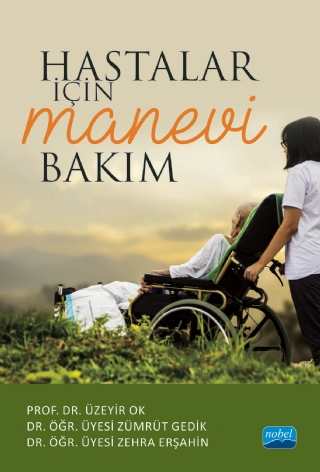
Spiritual care and counseling, which is one of the application areas of the psychology of religion, has a strong potential in human service in different conditions. Religions and spiritual traditions; It is known that they have important roles in coping with the difficulties of life, making sense of life, feeling belonging to a social group, creating an identity and choosing a healthy life for people who belong to them. On the other hand, helping and caring for people living in difficult conditions is a universal human instinct. Helping gratuitously on a voluntary basis is seen as a virtue in almost all life philosophies and religious-spiritual traditions.
In Turkey, studies in the field of spiritual care and counseling, which bring together humanitarian service and religion-spiritualism, have gained momentum in the last 10 years. However, there are very few studies that deal with the subject holistically and in depth and emphasize the scientific basis. This book on spiritual care for the sick in hospitals intends to take existing studies a step further, both in terms of providing an empirical basis and in terms of being dedicated to a particular field.
After explaining the effect of spirituality on human mental and physical health in detail in the book, the spiritual care needs of the patients were compared with the non-sick groups in the study, and the perception levels of the religious officials who still practice spiritual care, their competencies, personality dimensions and field experiences that are effective in their competencies are discussed in depth. In addition to these, in this book, a hospital spiritual care study model has been tried to be created in line with the empirical findings and literature knowledge.
In Turkey, studies in the field of spiritual care and counseling, which bring together humanitarian service and religion-spiritualism, have gained momentum in the last 10 years. However, there are very few studies that deal with the subject holistically and in depth and emphasize the scientific basis. This book on spiritual care for the sick in hospitals intends to take existing studies a step further, both in terms of providing an empirical basis and in terms of being dedicated to a particular field.
After explaining the effect of spirituality on human mental and physical health in detail in the book, the spiritual care needs of the patients were compared with the non-sick groups in the study, and the perception levels of the religious officials who still practice spiritual care, their competencies, personality dimensions and field experiences that are effective in their competencies are discussed in depth. In addition to these, in this book, a hospital spiritual care study model has been tried to be created in line with the empirical findings and literature knowledge.

“Sometimes speaking the same language is not enough, it is also necessary to understand from the same place.” T. S. Eliot
Communication and psychology are two intertwined concepts. Two basic building blocks that people act involuntarily wherever and with anyone: communication and psychology. When we say human, we are not talking about a species that has evolved within its own species, can use advanced tools, can laugh, think, and has its own culture and language. We're also talking about a complex brain with emotions and the behavioral patterns it guides us through. We interpret, perceive and compare. While doing all these, we feel, affect and be affected. Sometimes we put them on the tongue, sometimes on the body. But somehow we show it anyway. Understanding the person or the other in a constant struggle of self-expression... This book; He talks about the intersections of communication and psychology, the psychological foundations of communication, personality traits, perception, empathy, culture, communication with others, films that reflect us, and family communication. It examines the communication process that the individual establishes with himself and others through what we feel and perceive. It gives clues that healthy communication in the fiction of life will not occur independently of psychology. This book, which we have realized with young academician friends, is actually a processual synthesis of the communication that a person establishes with himself and others. Communication psychology is the search for a meaning to our existence. In the hope that you will accompany us on this path where we seek the meaning of the whole of which we are a part...
Communication and psychology are two intertwined concepts. Two basic building blocks that people act involuntarily wherever and with anyone: communication and psychology. When we say human, we are not talking about a species that has evolved within its own species, can use advanced tools, can laugh, think, and has its own culture and language. We're also talking about a complex brain with emotions and the behavioral patterns it guides us through. We interpret, perceive and compare. While doing all these, we feel, affect and be affected. Sometimes we put them on the tongue, sometimes on the body. But somehow we show it anyway. Understanding the person or the other in a constant struggle of self-expression... This book; He talks about the intersections of communication and psychology, the psychological foundations of communication, personality traits, perception, empathy, culture, communication with others, films that reflect us, and family communication. It examines the communication process that the individual establishes with himself and others through what we feel and perceive. It gives clues that healthy communication in the fiction of life will not occur independently of psychology. This book, which we have realized with young academician friends, is actually a processual synthesis of the communication that a person establishes with himself and others. Communication psychology is the search for a meaning to our existence. In the hope that you will accompany us on this path where we seek the meaning of the whole of which we are a part...
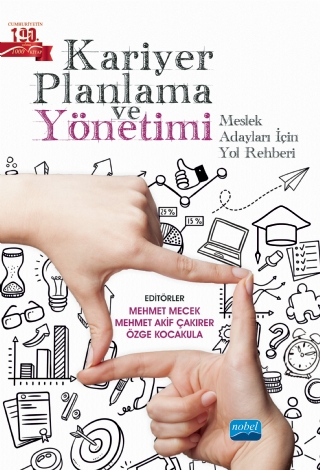
Career planning refers to the strategy one uses to set career goals and the ways to reach those goals. Having a career plan is critical for candidates who want to be successful not only in business but in all areas of life. Career planning is a multi-stage process in which career stages must be comprehensively addressed and executed in order for the candidate to achieve the success they want to achieve. With career planning, the candidate will have the chance to think in advance about alternative ways and routes for his future professional life, so that he will be able to construct his career journey on a “scenario-based” basis. A thoughtful career plan will both shape social life and provide a roadmap for the professional future. Thus, it will be possible to make informed choices about current job opportunities and potential future career opportunities. This book has been prepared with the contributions of expert academics, aimed at candidates, academics and professionals in business life who are looking for a guide both to see the current opportunities in their career journey and to explore potential career opportunities in the future. In each section, besides theoretical information, success stories of real people in their career journeys, advisory opinions given by experts in the field to candidates related to the subject, and additional reading suggestions for readers who want to deepen in the relevant section, as well as movie recommendations are given. We wish you a pleasant reading, hoping that it will be a useful guide for all readers.

Spirituality is one of the important elements of the human experience. Spirituality, structures and behaviors related to spirituality have an undeniable potential in terms of well-being in sub-fields of psychology and especially psychological counseling. Spiritual experience, both positive and negative, cannot be separated from human functionality. In many applied and theoretical studies in the field of psychology, it has been wondered and examined how spirituality functions in human cognition, behavior and emotional processes since the early years of the field's formation. Especially in recent years, spirituality has started to be considered as a potential resource in terms of psychological well-being and functionality in applied psychology research and psychological help fields, and many approaches and methods have been developed that take spirituality into account in the psychological help process. The book is the first of its kind in Turkey with a comprehensive content of spiritual counseling services in institutions, from the spiritual aspects of counseling theories, to the spiritual evaluation of the clients, to the relations of various religious traditions with spiritual counseling. The book, which aims to shed light on the transcendent dimension of human beings for students and employees who receive education in all fields of mental health, especially PDR and Psychology, is enriched with case examples.
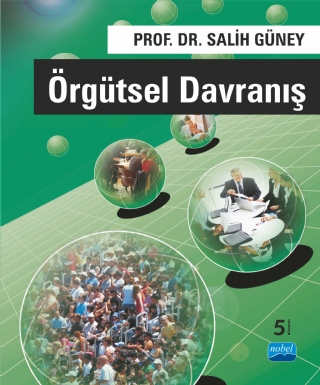
The reality underlying the success of organizations in today's globalization process is organizational internal effectiveness and efficiency. Because in difficult market conditions, organizations can continue their existence as long as they keep efficiency and productivity at high levels. The basic key to bringing efficiency and productivity to the desired levels is to know the "organizational structure" well.
Organizational behavior becoming a scientific discipline is very recent. However, the basic subject of organizational behavior, the human being and his productive work is very old. The interest of all scientists working on the organization has always focused on people and their efficiency.
People take part in an organizational structure at a certain period of their lives. The existence of people in organizational life depends on their success. This is closely related to the personal development of people. In this direction, Behavioral Sciences and Organizational Behavior trainings gain importance.
This book, whose chapter titles and topics were chosen primarily based on the needs of those who aim to be successful in business life, enables individuals to take a closer look at themselves and their business lives.
Organizational behavior becoming a scientific discipline is very recent. However, the basic subject of organizational behavior, the human being and his productive work is very old. The interest of all scientists working on the organization has always focused on people and their efficiency.
People take part in an organizational structure at a certain period of their lives. The existence of people in organizational life depends on their success. This is closely related to the personal development of people. In this direction, Behavioral Sciences and Organizational Behavior trainings gain importance.
This book, whose chapter titles and topics were chosen primarily based on the needs of those who aim to be successful in business life, enables individuals to take a closer look at themselves and their business lives.
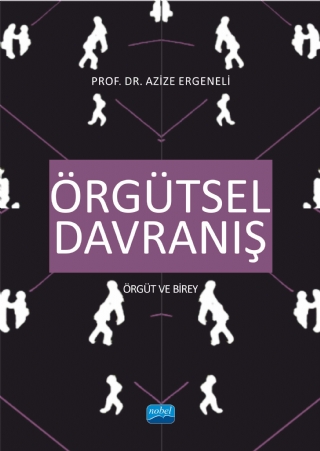
Organizational behavior is to understand the behavior of people working in the organization, both as individuals and as group members, so that organizations can be managed effectively. Understanding behaviors and their causes is important because it allows managers to predict the future behavior of individuals, to direct and control them in line with the goals of the organization. This book has been prepared with the development of the book called Organization and Human, which was written to provide both theoretical information and guidance on what can be done in practice for people who are candidates for management, but is completely exhausted.
For this purpose, the book consists of two parts: Organization and individual. In the part of the organization, the definition of the organization is given and the studies that require the definition of the organization as a socio-technical system are included, the interaction between the organization, the environment, technology and the organizational structure and its relations with the working individuals are mentioned.
In the individual part, first of all, the individual differences that make a person special as someone working in the organization are discussed. It has been tried to explain the formation of the personality traits of the individual and the factors affecting it, the learning process that has an important effect on his personality, the effect of what he has learned on his attitudes and how they shape his perception, and finally what causes his behavior.
Individuals may behave differently as a group member than when they are alone. Since the employees in organizations have to be in at least one work group, the behavior of the individual in the group has been tried to be explained, so that the people who will be managers are given theoretical and practical information about how they should manage individuals as a group member. In this section, it has been tried to convey information to the manager candidates about establishing a healthy communication, motivating the employees correctly, leading them effectively, explaining the reasons for the conflicts and stress they experience and how they can cope with it.
For this purpose, the book consists of two parts: Organization and individual. In the part of the organization, the definition of the organization is given and the studies that require the definition of the organization as a socio-technical system are included, the interaction between the organization, the environment, technology and the organizational structure and its relations with the working individuals are mentioned.
In the individual part, first of all, the individual differences that make a person special as someone working in the organization are discussed. It has been tried to explain the formation of the personality traits of the individual and the factors affecting it, the learning process that has an important effect on his personality, the effect of what he has learned on his attitudes and how they shape his perception, and finally what causes his behavior.
Individuals may behave differently as a group member than when they are alone. Since the employees in organizations have to be in at least one work group, the behavior of the individual in the group has been tried to be explained, so that the people who will be managers are given theoretical and practical information about how they should manage individuals as a group member. In this section, it has been tried to convey information to the manager candidates about establishing a healthy communication, motivating the employees correctly, leading them effectively, explaining the reasons for the conflicts and stress they experience and how they can cope with it.
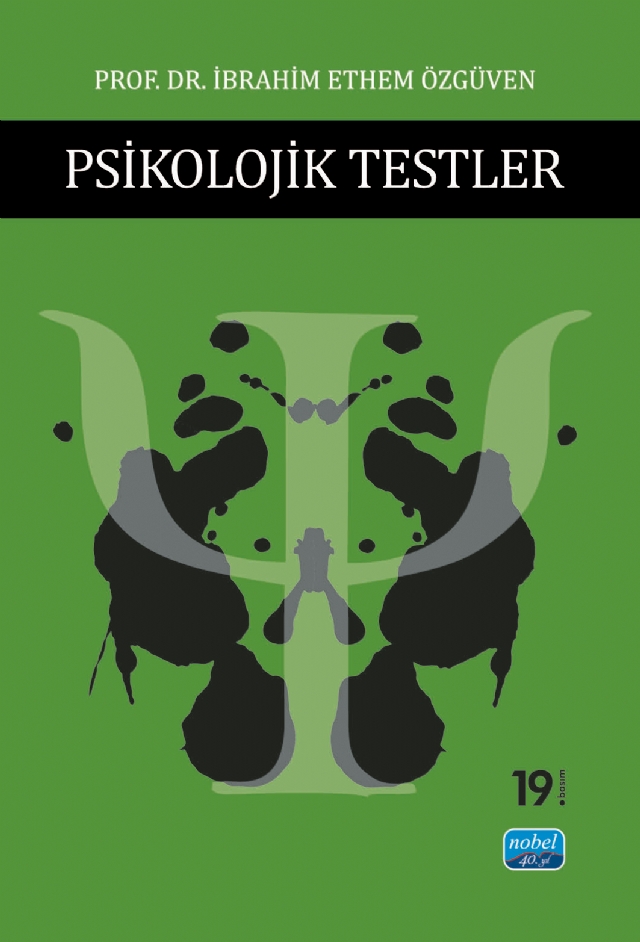
Parallel to the developments in the world, "psychological tests" in our country started as a "translation" movement of tests developed in other countries at the beginning of the current century, and there was no development effort and effort on the tests. In today's sense, writing, testing, applying, doing item analysis, choosing good questions and preparing the posttest, and conducting validity and reliability studies started in the mid-1950s. In the period since the 1950s, important institutions have been established in the fields of measurement technique, psychological tests and test development in our country.
Increasing demand for tests; It has enabled the rapid development of psychology and the branch of psychological tests in our country compared to other branches. Psychological Tests book; He focused on "test development", "appropriate use of psychological tests and appropriate interpretation of the obtained scores", "introducing psychological tests, especially those found in our country".
This book is about psychological tests in undergraduate and partially graduate programs applied in psychology, psychological counseling, psychiatry, assessment and evaluation, program development, child development and education, vocational and technical education, special education, classroom teaching, social services and other related departments of universities. It has been prepared as a “textbook” that can be read.
Increasing demand for tests; It has enabled the rapid development of psychology and the branch of psychological tests in our country compared to other branches. Psychological Tests book; He focused on "test development", "appropriate use of psychological tests and appropriate interpretation of the obtained scores", "introducing psychological tests, especially those found in our country".
This book is about psychological tests in undergraduate and partially graduate programs applied in psychology, psychological counseling, psychiatry, assessment and evaluation, program development, child development and education, vocational and technical education, special education, classroom teaching, social services and other related departments of universities. It has been prepared as a “textbook” that can be read.
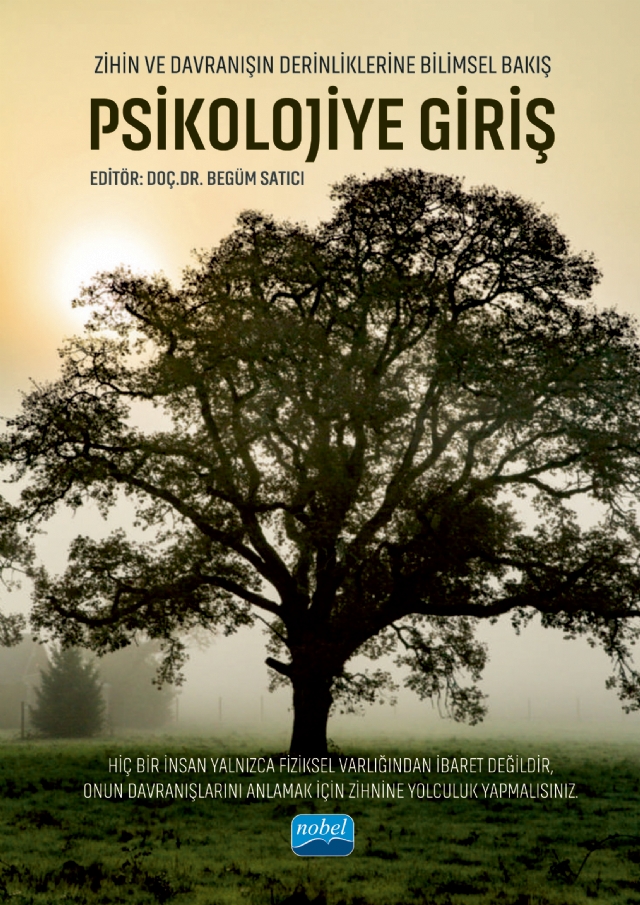
Since you have started to read this book, we can assume that you have an interest and curiosity in psychology. Psychology attracts the attention of almost everyone at some point because it tries to explain the "me" as a human being. Some want to understand themselves, some their partner, their boss, some their children and some their parents. In other words, the effort to understand people and ourselves in the first place leads us to learn psychology. As in the verses of the famous folk poet of Anatolia, Yunus Emre, which are rosewood in our language, "Science is knowledge, knowledge is knowing yourself, if you do not know yourself, it is a lot of reading".
However, this self-knowledge, self-learning, self-discovery can often turn into a toy in the hands of those who turn science into a profit for their own interests. As a matter of fact, not understanding psychology correctly "Are you reading my mind now?" It may also cause you to become the target of the question. “I am also interested in psychology.”, “We also understand psychology, I love personal development books.” Such sentences will be some of the things that those who will specialize in this field will often hear. So, is psychology really a field that anyone who is interested in can specialize in by reading a few books? I can imagine that you answered “no” to this question. Still, it can be equally dangerous to popularize psychology too much and push it away from science, leaving it only in the hands of scientists and making it elitist. Because science will only be useful as long as it reaches people and continues to develop like a living organism in life.
The science of psychology was shaped centuries ago by the answers given by philosophers to the questions they asked to understand human, and then it was born as a science on the basis of physiological studies. Psychology continues to keep our curiosity alive today, with hundreds of theories and millions of concepts written about it.
However, this self-knowledge, self-learning, self-discovery can often turn into a toy in the hands of those who turn science into a profit for their own interests. As a matter of fact, not understanding psychology correctly "Are you reading my mind now?" It may also cause you to become the target of the question. “I am also interested in psychology.”, “We also understand psychology, I love personal development books.” Such sentences will be some of the things that those who will specialize in this field will often hear. So, is psychology really a field that anyone who is interested in can specialize in by reading a few books? I can imagine that you answered “no” to this question. Still, it can be equally dangerous to popularize psychology too much and push it away from science, leaving it only in the hands of scientists and making it elitist. Because science will only be useful as long as it reaches people and continues to develop like a living organism in life.
The science of psychology was shaped centuries ago by the answers given by philosophers to the questions they asked to understand human, and then it was born as a science on the basis of physiological studies. Psychology continues to keep our curiosity alive today, with hundreds of theories and millions of concepts written about it.
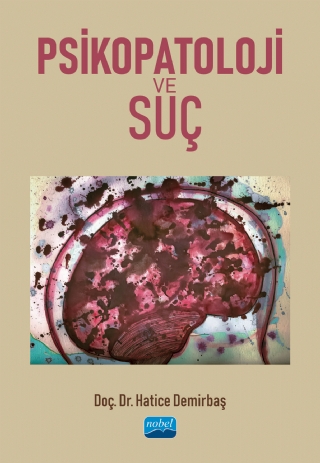
Psychopathology and Crime is a book that will contribute to the field of forensic psychology arising from the relationship established between law and psychology in order to apply the knowledge and principles of general psychology to legal issues and problems. Although forensic psychology is a rapidly developing field in recent years, the number of books written in this field is limited. Psychopathology and Crime is one of the resources that will remove this limitation.
In the book, the relationship between mental disorders and crime; it has been conveyed in different dimensions as a guide to forensic psychologists, psychiatrists, experts working in the psychosocial services in prisons and lawmakers, who are experts in the judicial system. Various mental disorders; schizophrenia, mood disorders, alcohol use disorders (alcohol/substance addiction), mental retardation, personality disorders, dementia, epilepsy and old age are discussed in the context of crime.
This book; it is a new Turkish resource that can be consulted whenever there are topics such as the prevalence of mental disorders in criminals, their defining features, the types of crimes they have committed, their criminal responsibilities, treatments, and the precautions to be taken.
In the book, the relationship between mental disorders and crime; it has been conveyed in different dimensions as a guide to forensic psychologists, psychiatrists, experts working in the psychosocial services in prisons and lawmakers, who are experts in the judicial system. Various mental disorders; schizophrenia, mood disorders, alcohol use disorders (alcohol/substance addiction), mental retardation, personality disorders, dementia, epilepsy and old age are discussed in the context of crime.
This book; it is a new Turkish resource that can be consulted whenever there are topics such as the prevalence of mental disorders in criminals, their defining features, the types of crimes they have committed, their criminal responsibilities, treatments, and the precautions to be taken.

This book deals with social influence, attitude change and persuasion, which are among the most popular topics in social psychology, political science, marketing and communication sciences.
"Social influence and persuasion", which is an extremely important issue in terms of both public relations, advertising and mass communication studies, is also of great importance in terms of efforts to cope with social problems such as smoking and substance abuse, inequalities in education, and non-compliance with traffic rules.
Persuasion has a special place in daily life as well. We are constantly trying to persuade family members, friends, the opposite sex, and our employers.
This subject, which has both individual, social and global importance, is covered in this book by defining basic concepts in detail, examining traditional and contemporary theoretical approaches, and giving practical clues in line with current research findings.
"Social influence and persuasion", which is an extremely important issue in terms of both public relations, advertising and mass communication studies, is also of great importance in terms of efforts to cope with social problems such as smoking and substance abuse, inequalities in education, and non-compliance with traffic rules.
Persuasion has a special place in daily life as well. We are constantly trying to persuade family members, friends, the opposite sex, and our employers.
This subject, which has both individual, social and global importance, is covered in this book by defining basic concepts in detail, examining traditional and contemporary theoretical approaches, and giving practical clues in line with current research findings.
